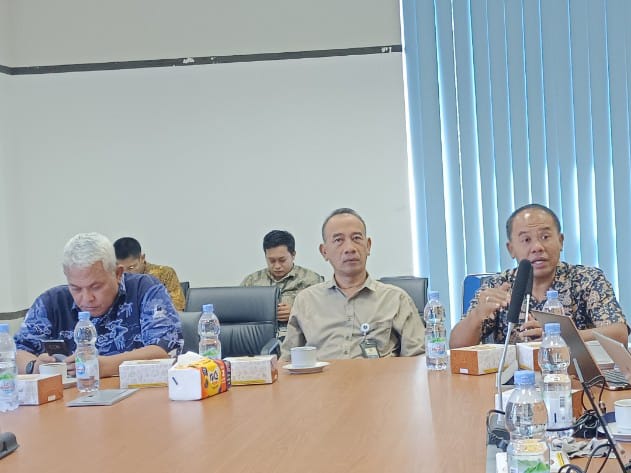Gadjah Mada University Academics Visit South Sumatra LRT, Discuss Strategic Issues

Palembang - A team of academics from Universitas Gadjah Mada (UGM) visited the Light Rail Transit (LRT) of South Sumatra to discuss a number of strategic issues related to the operation and management of mass transit systems. The visit was part of an effort to increase collaboration between academia and industry in developing a more efficient and sustainable transport system in Indonesia.
The South Sumatra LRT, which started operations in 2018 as one of the major projects for the Asian Games, has become an important part of the transport infrastructure in South Sumatra, particularly in the city of Palembang. However, the operation of the LRT still faces several challenges, especially in terms of maintenance, asset management, and management of feeder systems that can optimise the mobility of the community.
One of the issues discussed at the meeting was the maintenance of the South Sumatra LRT. As a modern infrastructure using high technology, regular and continuous maintenance is crucial to ensure that the South Sumatra LRT can continue to operate well. The UGM academic team, consisting of experts in engineering, transport, and infrastructure management, discussed with LRT management the challenges of maintenance, ranging from spare parts and repair technology to technical training for the local workforce.
Professor Rifai, one of the academics, emphasised the importance of collaboration between academia and industry to create an efficient maintenance model. We see the need for an improved data-driven maintenance management system where each component of the LRT can be monitored in real time to detect potential damage early. This will reduce the risk of service disruption and extend the life of existing infrastructure,' he said on Friday, 18 October 2024.
In addition to maintenance, the management of the South Sumatra LRT assets was also a key topic at the meeting. Currently, the South Sumatra LRT has various important assets, including stations, platforms, pillars, parapets, and other supporting infrastructure. However, the main challenge is how to manage these assets efficiently and productively to support the long-term sustainability of LRT operations.
Another topic of discussion was the management of feeder lines, which play an important role in supporting the accessibility of the South Sumatra LRT. Currently, there are still challenges in integrating the feeder system with LRT operations. The lack of well-coordinated feeder routes often makes it difficult for people to access LRT stations, thus reducing potential passengers.
In this case, UGM suggested the need for in-depth studies to develop a more effective feeder network, both in terms of routes, frequency, and fares. They also suggested working with the local government to formulate policies to support transport integration in South Sumatra.
According to Suprapto, one of the academics involved in the study, improving feeder services is essential to extending the reach and increasing the attractiveness of LRT as a primary mode of transport. We will help provide technical recommendations based on the results of field studies and simulations of the community's mobility needs," he said.
Another topic of discussion was the management of feeders, which play an important role in supporting the accessibility of the South Sumatra LRT. Currently, there are still challenges in integrating the feeder system with LRT operations. The lack of well-coordinated feeder routes often makes it difficult for people to access LRT stations, thus reducing potential passenger numbers.
In this case, UGM suggested the need for in-depth studies to develop a more effective feeder network, both in terms of routes, frequency, and fares. They also suggested working with the local government to formulate policies to support transport integration in South Sumatra.
According to Suprapto, one of the academics involved in the study, improving feeder services is essential to extending the reach and increasing the attractiveness of LRT as a primary mode of transport. We will help provide technical recommendations based on the results of field studies and simulations of the community's mobility needs," he said.
The visit of the UGM academics to the South Sumatra LRT is expected to be the starting point for closer cooperation between the academic sector and the transport industry in Indonesia. With this synergy, it is expected that significant improvements in operations, maintenance, asset management, and transport integration can be implemented immediately.
The head of the South Sumatra Light Railway Management Centre (BPKARSS), Rode Paulus, welcomed the input from UGM and hoped to implement some of the recommendations discussed. In the long term, this collaboration is expected to improve South Sumatra LRT services to the community and support sustainable transport infrastructure development in the region.
With various strategic issues discussed, from maintenance and asset management to feeders, this visit is an important step in the development of a more modern and efficient public transport system in South Sumatra. In the future, it is hoped that this mode of transport will not only provide mobility solutions for the community but also become an example for public transport management in other cities in Indonesia.



Komentar
LOGIN FOR COMMENT Sign in with Google